
Members of the New American Leaders (NAL) at Friday's event. Photo by Brenda Verano
The harmful myths about homelessness, the various factors that contribute to it, and the concept of managing versus ending homelessness were just some of the topics discussed in a presentation and panel discussion hosted by the New American Leaders (NAL), a nonprofit organization that supports people of immigrant heritage or descent running for elected office throughout the United States.
Last Friday, 19 elected officials who are part of NAL’s nationwide cohort visited Los Angeles, the second largest city in the country and with the most comprehensive housing initiatives, to learn, collaborate and work toward solutions for housing and homelessness.
The idea behind Friday’s event was to have elected officials learn from L.A.’s housing rights advocates and housing experts so that they could return to their home jurisdictions with new knowledge and examples of applied policy and strategy that they can utilize in their communities.
Since its founding in 2010, NAL, the national nonpartisan organization, has focused on bringing first- and second-generation Americans into politics.
In the past 15 years, NAL has trained more than 2,000 new Americans, empowering them to bridge the gap between underrepresented communities and political power. Many of those in attendance on Friday were council members, assembly members, trustees, commissioners, mayors and congresspersons from Oregon, Minnesota, Puerto Rico, California, New York, and Maine, among other places.
Juan Marcano, national director of governance programs at NAL, told CALÒ News that Friday’s event was just one of four where NAL members can learn about the movement-building, policy-driven work and visionary possibilities. “This is part of the continuing education services that we provide for New American members after they're elected into office,” Marcano said. “There are a lot of organizations out there that exist that will train you on how to run a campaign, but then, and that's it. You win, and you’re kind of left to figure everything out on your own.”
As a former council member in Aurora, Colorado, where he served from 2019 to 2023, Marcano said he knows firsthand the importance of networking and connecting with other newly-elected officials from different parts of the U.S. He also said these types of meetings and panels that host first- and second-generation immigrants are even more important now, in a time when anti-immigrant rhetoric is on the rise in the country.
“That just makes the work that we do as an organization all the more important. We can counter that dominant anti-immigrant narrative and show that immigrants are just as American as anybody else. Yeah, this is a nation of immigrants,” he said.
Panelists who participated in Friday’s events were Seth Pickens, managing director of USC’s Homelessness Policy Research Institute and Sam Tsemberis, the founder and executive director of Pathways to Housing, a housing-first program for individuals with serious mental illnesses, long histories of homelessness and often co-occurring substance abuse.
“ Stigma is huge in and of itself,” Pickens said when talking about homelessness. He said that when people think about the people experiencing homelessness, we think about people fleeing domestic violence, people with substance abuse and people with severe mental illness, and although many people who are homeless are experiencing these things, the majority of people fall into homelessness because they could not pay their rent. “That makes homelessness an economic problem,” he added.
In 2024, for the first time in six years, the homeless count revealed a slight drop in the number of homeless people throughout L.A. County, including the City of Los Angeles. Latinos made up the largest percentage of homeless individuals (43%). They were followed by Black people (31%) and whites (29%).
Tsemberis talked about the importance of public housing in cities trying to tackle homelessness at a greater level. “The solution to all of this homelessness is public housing. That's what we have to think about. So, when you are listening to bills or proposals or anything to do with homelessness, if it doesn't have [a built-in] solution that talks about permanent housing for the person being served, then it's not a solution to homelessness; it's a management of homelessness,” he said.
Similar to Pickens, Tsemberis argued that there is still a narrative around homelessness that needs to be deconstructed and destigmatized. “There are still beliefs that people are homeless because they want to be, because they're addicted and the addiction is a choice and the mental illness is something they don't want to treat and they don't want to go to shelters,” Tsemberis said. “That’s not true. There's no empathy or understanding. These are conditions that make you poor. If you have a mental illness or you're struggling with addiction, it's hard to hold the job, and you have no money; if you have no money, you can't pay the rent.”

(left) Seth Pickens, managing director of USC’s Homelessness Policy Research Institute and (right) Sam Tsemberis, the founder and executive director of Pathways to Housing. Photo by Brenda Verano
He said one can see this pattern in the distribution of where people are homeless the most. “There are about 770,000, which is still an undercount, of all of the people who are homeless [in the country] and the majority, 70%, are living on the streets between Seattle and San Diego and New York and Miami, on the coasts,” he said. “It's not because there's more mental illness on the coasts; it's because all of the unaffordable housing is on the coast. If you look at the price of rent and the homeless map transposed one over the other, that's what you see that gives you what the root cause of homelessness is. We have to address the housing first.”
The growing number of young people experiencing homelessness was also one of the main issues talked about at Friday's event and discussion.
In L.A. County in 2023, more than 75,500 people of all ages experienced homelessness, according to the L.A. Homeless Services Authority homeless count, and about 4,000 of those were youth ages 18 to 24. A number that experts say can be much greater, since many youth sleep in their car and couch surf.
Isaiah Ette, the community empowerment and engagement director at the California Homeless Youth Project, said youth should be an integral part of homeless prevention and homelessness conversions overall.
“ We can't talk about these things without having the future at the table,” they told CALÒ News. People fail to realize that when you exclude youth, you exclude the future; you are discrediting the value of having that new eyesight on issues and solutions that maybe you don't have in the [youth’s] perspective that you will never carry.”
Ette, who was also once homeless, said that homelessness in L.A. is a “very complex, convoluted, greed-filled issue.”
They said it's important to address homelessness with a justice-centered lens. “ In this country, we failed to realize that a lot of the housing insecurity that is experienced is a direct correlation to discrimination and racial segregation practices. The birth of homelessness came from things like redlining and slavery and from not allowing communities to have and attain housing,” Ette said.
“I would say invest in your youth and by doing so, you will invest in your future,” Ette said when asked what would be one recommendation for NAL members, who will go back and tackle homelessness in the respective areas that they lead.
Bryan Osorio is a council member for the city of Delano, in Kern County, California. He was one of the youngest elected leaders at Friday’s event. Osorio, 29, who was first elected when he was only 22 years old, said homelessness and housing rights are crucial in a place like Kern County, where the majority of the population are Latino who work in agricultural fields.
“ Some of the topics that we covered this afternoon are related to some of the issues that Delano experiences, most importantly around housing affordability,” Osorio told CALÒ News. I know we talked about different aspects around public housing today but the direction that I'm in agreement with is that we have to just build more affordable and public housing and we also need to consider our demographics.”
“Delano is predominantly a Latino community,” he added. “It's known to be a farmworker community. We have to build more housing and also be considerate in how equitably we, as elected leaders, are pursuing the growth of our community to match the needs of our residents.”
Also in attendance, representing Latinos and Californians, was Mario Enríquez, who serves as a councilman for the City of Stockton, California. In 2024, he became the first openly gay Latino elected to the city council. “It's an honor to represent my state and especially the Central Valley,” he said. “Central Valley has a lot of hardworking people. You know, we feed a third of the country. Agriculture is rich.”
Enríquez said that as an NAL member, he is happy to learn alongside other elected officials serving Latinos throughout the country. “I’m a student at heart,” he said. “For me to learn from other people from different backgrounds on how they're tackling homelessness is really important.”
He told CALÒ News that as a Latino, it was important to attend panels like this to help destigmatize homelessness within that community. “It’s important for me to tell the Latino perspective,” he asserted. “Homelessness is so stigmatized in the Latino community, so to be able to address that is really important and to be able to provide, as a child of immigrants, perspective on things like paying rent and making ends meet is really impactful.”
To learn more about the New American Leaders, visit https://newamericanleaders.org/.

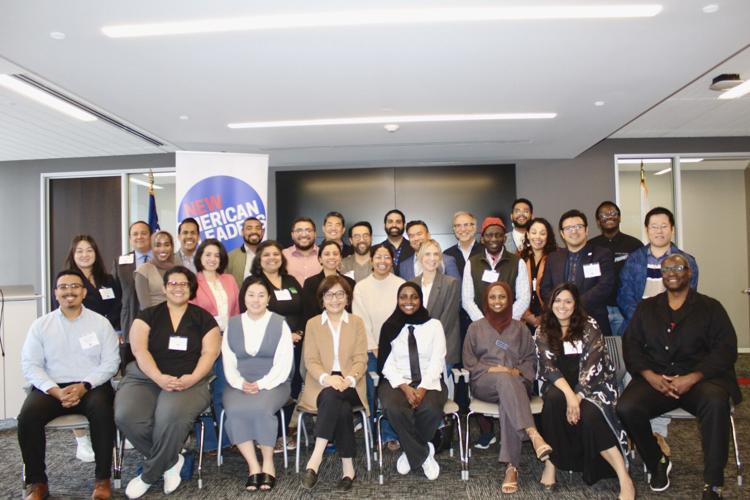
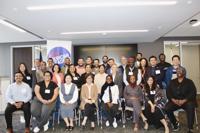
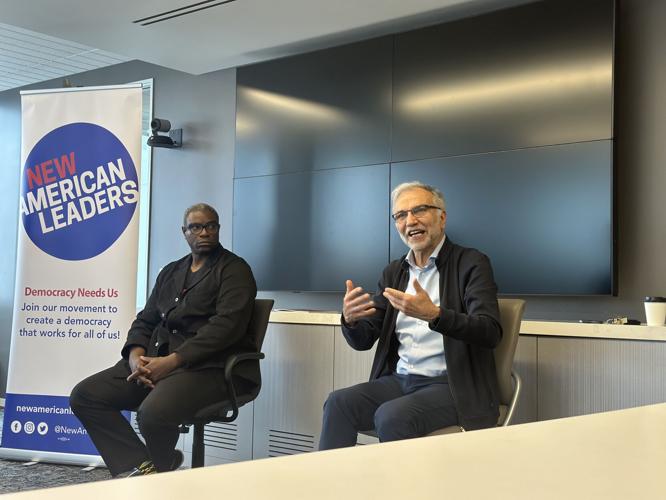
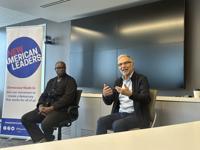







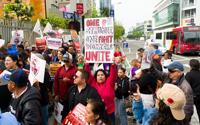
(0) comments
Welcome to the discussion.
Log In
Keep it Clean. Please avoid obscene, vulgar, lewd, racist or sexually-oriented language.
PLEASE TURN OFF YOUR CAPS LOCK.
Don't Threaten. Threats of harming another person will not be tolerated.
Be Truthful. Don't knowingly lie about anyone or anything.
Be Nice. No racism, sexism or any sort of -ism that is degrading to another person.
Be Proactive. Use the 'Report' link on each comment to let us know of abusive posts.
Share with Us. We'd love to hear eyewitness accounts, the history behind an article.